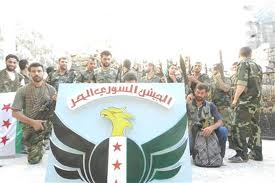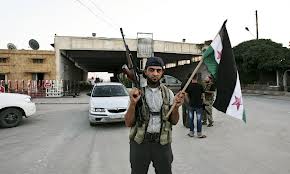 WHILE THE UN dithers over whether to accept Turkey’s proposal for a safe zone within Syria, the Free Syrian army is quietly carving out its own “mini state” from the towns and strategic areas it now controls.
WHILE THE UN dithers over whether to accept Turkey’s proposal for a safe zone within Syria, the Free Syrian army is quietly carving out its own “mini state” from the towns and strategic areas it now controls.
Since capturing the crucial border town of Azaz six weeks ago, the FSA has even reopened the adjoining Bab al-Salama border crossing with Turkey, allowing foreign journalists, politicians and financiers supportive of its cause to cross over into Syria.
After passing Turkish immigration and walking down a long, blisteringly hot tarmac road, lined on either side by minefields and open sewage, visitors come to a gate which stands ajar. They are are greeted by an overhead banner announcing their arrival at the “Free Syria” customs point. Once inside, FSA soldiers stamp their passports with a date of entry to the “Arab Republic of Syria”.
Before the war, this was a busy crossing point for trade between Turkey and Syria, but these days journalists make up the vast majority of arrivals. Once inside Syrian territory, they are politely ushered into a yellow-brick building, divided by wooden panels into three rooms that serve as the press office for “The Northern Storm Brigade”, a chapter of the FSA which controls the border area, the medieval city of Azaz and territory on the northern outskirts of Aleppo.
“The media is very important to us. We want to show the world what we are doing and be seen as a credible little state,” explained press officer Nader Azaz, who in pre-revolution life worked as a basketball coach in Aleppo. The Northern Storm Brigade has divided itself into a number of areas of responsibility by setting up offices for military and security, political, revolutionary command, financial, relief, medical and press. Logos have even been produced for several departments.
“It’s not like a government, it is a government,” said the head of the military office, Capt Ahmed Abu Rashid, as he fiddled with his Kalashnikov. “We’ve decided to build a new country and this organisation is the basis for that.”

While all other offices currently feed into the revolutionary command, this power will eventually be transferred to the political office “once the revolution is complete”, he claimed. “My responsibility is the security of the citizens,” he said, “and let me tell you, if absolutely anyone does anything wrong here, I will put them in prison.”
The burden of government has already brought its own challenges. Relief centres situated in major towns distribute medicines, powdered milk, blankets and nappies. But disputes have arisen, as some citizens claim others are getting more than their fair share.
“It was easier to fight than to work here,” Azaz relief centre director, frontline veteran and former teacher Ahmed Karkouby said. “When you’re fighting, you’re only responsible for yourself and your men. Here I am responsible for an entire city.”
To adjudicate in most matters of law and order, the FSA has appointed a judicial committee made up of 10 civilians and operating from the small town of Mearah, to the southeast of Azaz.
The committee sits day and night with five members each working a 12-hour shift, operating from a bare and cramped building on a dusty mud road. Soldiers’ slogans such as “We’re in this Revolution to the End,” are the only decorations to adorn the unpainted walls.
The courtroom is a desk with a field telephone, from behind which two justices preside: a community leader and a religious scholar. The plaintiffs face them from a row of faux-leather chairs which line the other side of the room. Cases heard have covered the full spectrum of civil grievances, from disputes over money to marriage annulments.
“Judgments are based on a combination of Sharia law, as interpreted by the religious scholar, and common sense,” explained community leader and now justice Adel Haji. And the court’s pronouncements are final. Those who refuse to pay up a settlement or obey the court “will be taken by the soldiers to prison”, he said.
Back at the border headquarters, the makeshift medical centre, which occupies what was once the regime’s import/export chamber office, had seen the last of its patients for the day.
Dr Muaaid Abu Samih was stocktaking before shutting up shop. “I’m all for the FSA,” he said of the new fledgling administration. “At least you can criticise them if they do something wrong. Assad’s soldiers would have taken your life.”
Irish Times

Leave a Reply
You must be logged in to post a comment.